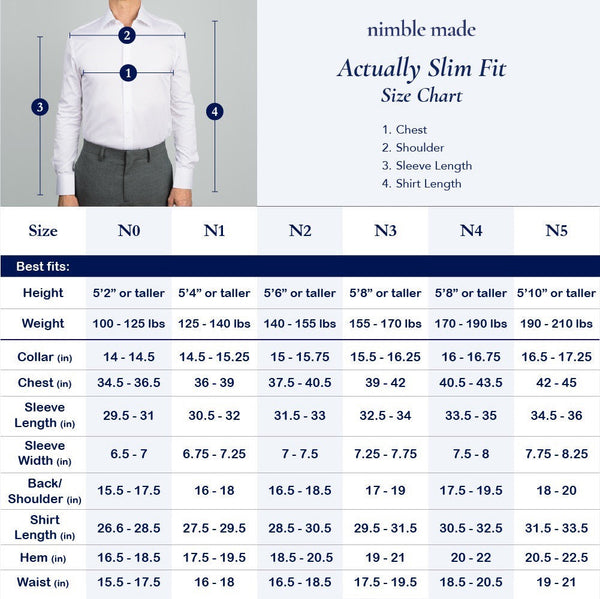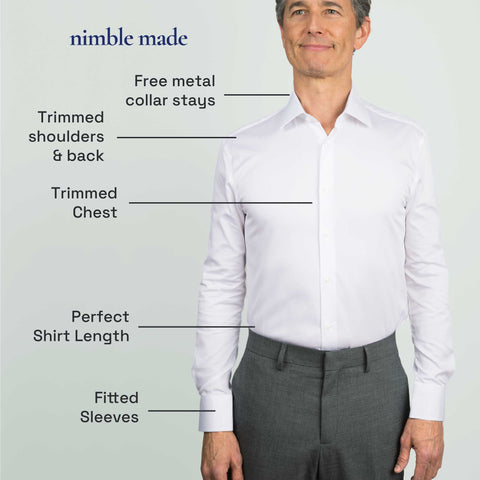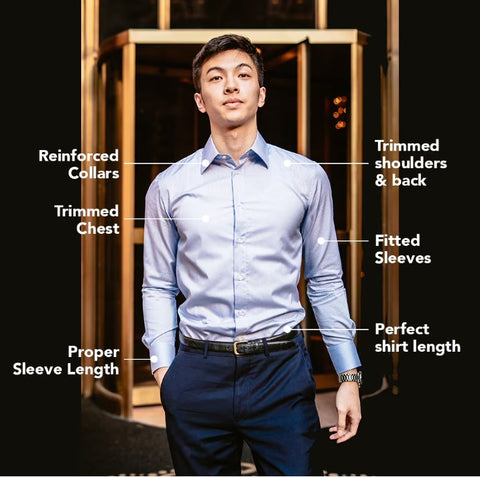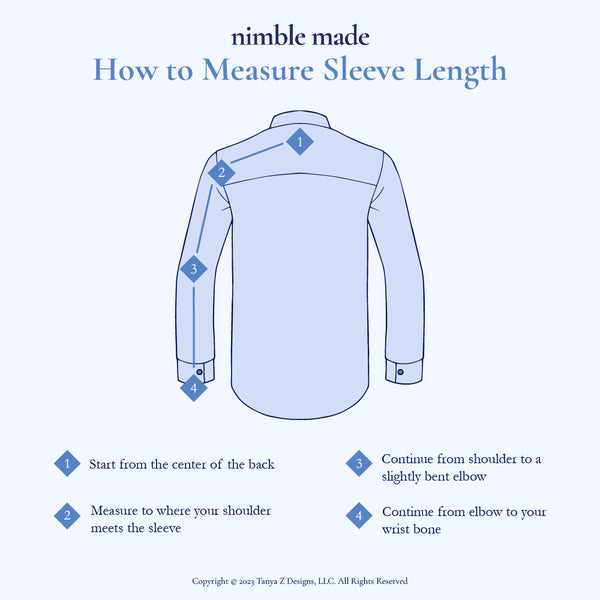
Short answer: There isn’t one “Asian size.” Labels in China, Japan, and Korea generally use cm body measurements and run about 1–2 US sizes smaller on the tag. Always match your body measurements, not just letters.
- Asian S → roughly US XS–S
- Asian XL → roughly US L–XL
Jump to: Shirt (tops) chart • Pants chart • Country notes • How to measure
Asian to US size chart — tops (men)
Use your chest measurement. Ranges are typical; brands vary.
| Asian label | Chest (cm) | Chest (in) | Likely US size |
|---|---|---|---|
| S | 86–91 | 34–36 | US XS–S |
| M | 91–97 | 36–38 | US S–M |
| L | 97–103 | 38–40.5 | US M–L |
| XL | 103–109 | 40.5–43 | US L–XL |
| XXL | 109–114 | 43–45 | US XL–XXL |
Asian to US size chart — pants/jeans (men)
Many Asian brands list waist in cm or numeric labels (29, 30, 31…). Convert cm ÷ 2.54 for inches.
| Label (common) | Waist (cm) | Waist (in) | Approx. US waist |
|---|---|---|---|
| 29 | 73–74 | 28.5–29.1 | US 28–29 |
| 30 | 75–76 | 29.5–30.0 | US 29–30 |
| 31 | 78–79 | 30.7–31.1 | US 30–31 |
| 32 | 81–82 | 31.9–32.3 | US 31–32 |
| 33 | 83–84 | 32.7–33.1 | US 32–33 |
| 34 | 86–87 | 33.9–34.3 | US 33–34 |
Quick country notes (CN / JP / KR)
- China (CN): Tops often labeled S–XXL with cm charts; pants may use numeric waist.
- Japan (JP): Uses S–XL and numeric; very measurement-driven in cm. Shoes are in cm length.
- Korea (KR): Similar to JP; cm first. Alpha sizes skew small vs US.
How to measure (so the chart works)
- Chest: Tape around the fullest chest, level across shoulder blades, relaxed breath.
- Waist: Natural waist (near navel) for trousers; jeans often use low waist—check brand notes.
- Convert: cm ↔ in (divide or multiply by 2.54).
Tip: Brand charts win. Use these tables as starting points, then check the product’s own size guide.
Not sure on your exact fit? Try our Fit Guide (made for slimmer builds). For footwear, see Chinese → US shoe sizes.
Introduction to Asian Sizes
Converting Asian sizes to US sizes can be a tricky but important step when it comes to providing a streamlined shopping experience as a clothing retailer.
As the co-founder of my e-commerce men's skinny fit shirt brand Nimble Made, I know firsthand how providing accurate sizing and detailed measurements to garments can be the key to helping customers find the right fit when shopping online.
Sizes from Asian clothing brands tend to run smaller compared to US sizes so shoppers may need to convert Asian sizes to make sure they have the correct fit. Providing detailed measurements and size charts to online shoppers will greatly reduce returns as a business owner.
Asian-founded Nimble Made's Slim Fit Shirts
Understanding the nuances of sizing standards across various regions is essential for online retailers and consumers navigating the international fashion landscape.
By familiarizing themselves with conversion techniques and sizing discrepancies, shoppers can confidently explore a wider range of options without the constraint of geographical boundaries.
This cultural and logistical awareness fosters inclusivity and accessibility within the fashion industry, promoting a more interconnected and globally-minded community of retailers and consumers.

Why Does Asian Sizing Differ
Anthropometric Factors
Research in the medical field suggests differences in bone quality may be the reason why Asian sizes tend to be slightly smaller.
The cross-sectional study assessed "differences in bone quality in young Asian and Caucasian (n = 30/group) men between 25 and 35 years. We found that Asians had smaller bones, thicker and denser cortices, and more plate-like trabeculae, but stiffness did not differ between groups."
Understanding the biological and anthropometric factors influencing clothing sizes is crucial not only for the fashion industry but also for promoting inclusivity and diversity in sizing standards.

Slim Fit Classic White Dress Shirt
Moreover, while bone quality differences contribute to the variance in clothing sizes between Asian and US standards, cultural factors also play a significant role. Cultural preferences regarding body image, fashion aesthetics, and societal norms influence the design and sizing of garments.
Cultural Preferences
In many Asian cultures, there is a preference for more form-fitting and tailored clothing styles, reflecting values of modesty and neatness. This cultural emphasis on sleeker silhouettes may lead to smaller sizing standards compared to the more relaxed fits often found in Western clothing.
Furthermore, historical and economic factors contribute to the evolution of sizing standards in different regions. For example, in Asian countries where the textile industry has traditionally focused on producing smaller sizes to accommodate smaller male body frames, sizing standards have been tailored accordingly.

In contrast, Western countries with larger average body sizes have developed sizing standards to accommodate a broader range of body shapes and sizes.
These historical and economic influences shape consumer expectations and perceptions of clothing sizes, reinforcing the need for businesses to understand and adapt to regional sizing differences.
Tips for Converting Asian Sizes for Your Online Store
As the global marketplace expands, finding the right fit online can be a challenge for shoppers. My business Nimble Made prides itself in a unique Actually Slim Fit that fits smaller than most brands in the US.
Translating our garment measurements into size conversion charts to educate our customers about our slim fit dress shirts was no easy feat. As a business owner, here's a few tips on how we did this:
Understand Sizing Variations
Familiarize yourself with the sizing standards used in Asian countries compared to those in your target market. Use size conversion charts or guides to determine how Asian sizes correspond to the US sizing system. Keep reading to use our online calculator size conversion.

Check Manufacturer Measurements
Request detailed measurements from your Asian manufacturers for each garment. This will allow you to provide accurate sizing information to your customers and minimize your return rate.
Research Customer Preferences
This is one of my favorite steps! Take the time to understand the sizing preferences of your target demographic. Consider factors such as body proportions, cultural norms, shopping behaviors, and preferred fit styles to tailor your sizing offerings accordingly.
Offer Clear Size Guides

In today's day and age, communicating effectively via your website and online size charts is of the utmost importance when operating in the e-commerce space. Provide comprehensive size guides on your website that include both Asian sizes and their equivalent sizes in your target market.
Include How-To Instructions
Give additional support to customers on how to measure their body to find the right size. I strongly believe in this point and empowering the customer to double-check Asian sizes and how to convert Asian sizes. Here are some guides I created for my brand:
Navigating the complexities of Asian sizes to US requires a strategic approach for online retailers. By understanding these differences and leveraging size conversion charts, businesses can effectively communicate their unique fit offerings to customers.
Requesting detailed measurements from manufacturers, researching customer preferences, and providing clear size guides are essential in ensuring a seamless shopping experience.
Additionally, offering instructions on how to measure oneself empowers customers to make informed decisions, ultimately enhancing satisfaction and reducing return rates.
Through these efforts, businesses can successfully bridge the gap between Asian and US sizing standards, facilitating confident purchases and building trust with their customer base.
Benefits of Accurate Size Conversions
By converting Asian sizes to US sizes, business owners can cater to a broader customer base, including shoppers in Western markets where US sizing standards are more prevalent. This allows for increased sales opportunities and market penetration.

For businesses targeting international markets, converting Asian sizes to US sizes is essential for overcoming language and cultural barriers. It simplifies the shopping process for customers who may be unfamiliar with Asian sizing standards, making it easier for them to make purchases from abroad.
Overall, converting Asian sizes to US sizes provides numerous benefits for business owners, including increased market reach, improved customer experience, and reduced returns, ultimately contributing to business growth and success.

Convert Asian Size to US Size
Asian Size to US Size Conversion Chart
Use our sizing chart to convert Asian sizes for clothing. Keep in mind that brands have different clothing sizes and size conversions so always refer to the sizing chart provided by the retail you're shopping at.
Whether you're selling or buying men's collared shirts or women's blouses, our size charts will empower you to find the perfect fit, regardless of geographical boundaries or cultural differences.
Women's Clothing Sizes - Asian Size to US Size Charts
| Asian Size | US Size | Chinese Height (CM) |
| S | XS | 160-165 |
| M | S | 165-170 |
| L | M | 167-172 |
| XL | L | 169-173 |
| XXL | XL | 172-176 |
Men's Clothing Sizes - Asian Size to US Size Charts
| Asian Size | US Size | Chinese Height (CM) |
| S | XS | 160 |
| M | S | 165 |
| L | M | 170 |
| XL | L | 175 |
| XXL | XL | 180 |
| XXXL | XXL | 185 |
Use Our Asian Size to US Size Calculator
Asian Sizes to US Calculator
US Size
Please try another size.
How We Did It at Nimble Made
Become the Subject Matter Expert for Fit
By undertaking the due diligence of understanding how garments fit and mastering the art of achieving the ultra-slim fit, we've established a level of trust and credibility with our customers. This expertise ensures that our customers can rely on us for dress shirts that fit impeccably.
In addition to our written content, we started a Youtube Channel where we share menswear insights, tips, and demonstrations related to fit. This platform allows us to engage with our audience on a more visual and interactive level, further solidifying our position as authorities in fit.
A crucial aspect of our success has been our collaboration with manufacturers who align with our brand mission and understand the pain points we aim to solve at Nimble Made.
By working closely with partners who share our vision for delivering a true slim fit like no other, we've been able to consistently meet and exceed the expectations of our customers.
This collaborative approach fosters long-term relationships with both our manufacturers and customers alike.
Over-Explain Your Sizes
If your business requires converting Asian sizes to US, size conversion will be crucial to exceeding customer expectations. As an e-commerce store with no physical retail spaces selling a unique fit, we can't let customers try on before purchasing so we had a work laid out for us.

Slim Fit Classic Blue Dress Shirt
We created our fit guide, detailed videos, photographed models of different sizes, and detailed size charts to explain our different sizing systems. Here's how to broke down size conversion through our sizes.
Leverage Customer Data in Size Calculators
We relied on traditional measuring tape methods to craft our comprehensive size chart at the beginning of our business. However, as we evolved, we introduced a sophisticated size calculator designed to refine the slim fit experience for our customers.
Considering factors such as height and weight, we've tailored our dress shirts to fit impeccably, converting these measurements into our unique N0-N5 sizes.

Whenever we receive inquiries regarding exchanges or returns, we actively seek fit feedback alongside height and weight details. This continuous feedback loop allows us to fine-tune and update our size calculator with each new data point, ensuring that our recommendations become increasingly accurate over time.
Harnessing customer data within our size calculators enhances the shopping experience and fosters trust in our website, particularly in the realm of size conversion and Asian clothing.
By leveraging this data-driven approach, we reinforce our commitment to providing personalized solutions that meet the diverse needs of our customers.
In Summary

In conclusion, figuring out the nuances of sizing differences between Asian and US markets is crucial for both consumers and retailers in today's globalized fashion landscape.
From understanding the underlying factors influencing sizing variations to implementing practical tips for finding the right fit, this article has provided valuable insights and strategies.

By leveraging size conversion charts, requesting detailed measurements from manufacturers, and considering cultural preferences, businesses can effectively cater to diverse customer needs and enhance the overall shopping experience.
It's important to note that size conversion charts, including those that convert Asian sizes to US sizes, don't fully capture the diversity of body types across different Asian populations.
Asia is a vast continent, with a wide range of ethnic groups, cultural influences, and genetic variations that can impact body shape and size. For instance, people in East Asia, Southeast Asia, and South Asia may have different body proportions, which makes it challenging to create a one-size-fits-all conversion system.

As a result, size charts are generalizations that may not work for everyone, and individuals should be mindful that they are only a starting point. The growing awareness of body diversity in fashion is encouraging brands to think more inclusively, but the standardization of sizes, whether Asian or Western, still has a long way to go in reflecting the true spectrum of body types.
With a commitment to accuracy, inclusivity, and customer satisfaction, retailers can successfully bridge the gap between Asian sizes to US sizing standards, empowering shoppers to make confident and informed purchasing decisions.
If you found this guide helpful, check out our other size conversion articles and size calculators like our sock sizes, shirt size calculator, suit size calculator, ring size calculator, and our fit guide for our Actually Slim Fit dress shirt sizes!
Frequently asked questions about Asian size to US size
What is an Asian size XL in US?
An Asian size XL typically corresponds to a smaller size in US sizing, often equivalent to a US size medium or large depending on the brand and garment.
What is my size in Asian size shoes?
To determine your size in Asian size shoes, you may need to refer to a size conversion chart or use our Chinese shoe size calculator, as sizing standards can vary between countries and manufacturers.
What is an American XL in Japan?
An American XL in Japan may vary, but generally, it could be equivalent to a larger size due to differences in body proportions and sizing standards between the two countries. Refer to a brand's sizing chart to find the right size conversion.
What is XL in US sizes?
XL in US sizes typically refers to extra-large, but it's important to check specific size charts for accurate measurements, as sizing can vary between brands and clothing items.




Comments (0)
Back to News